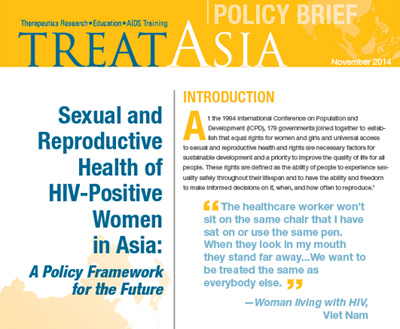FOR IMMEDIATE RELEASE
Media Contact:
Joana Casas, Program Communications Manager
+1(212) 806-1602; joana.casas@amfar.org
amfAR Report Examines Human Rights Abuses Faced by HIV-Positive Women in Asia
amfAR’s TREAT Asia program outlines how stakeholders can work together to protect the sexual and reproductive health rights of women living with HIV in the Asia-Pacific
NEW YORK, Dec. 11, 2014 – A new report released by TREAT Asia, a program of amfAR, The Foundation for AIDS Research, urges governments, public health authorities, healthcare providers and civil society in Asia to address persistent gaps in women’s access to reproductive healthcare, especially for women living with HIV in the region. The report finds that these women continue to face discriminatory treatment in healthcare settings, including being denied health services and not being informed of their reproductive options.
Furthermore, these women report being pressured to undergo abortions or sterilization procedures by some medical professionals, despite the fact that proper treatment can significantly reduce the chance of a mother transmitting HIV to her child and support the health of the mother. The report, titled Sexual and Reproductive Health of HIV-Positive Women in Asia: A Policy Framework for the Future, provides recommendations aimed at closing the existing gaps in the delivery of HIV prevention and care in Asia.
 Download the Report here.Chief among them, it urges governments to incorporate international standards for women’s sexual and reproductive health services into their national HIV strategies, enact protective laws, and establish support systems that ensure justice for women with HIV who experience rights violations. Public health authorities should also integrate HIV services with reproductive and maternal healthcare to enhance the quality of healthcare for women with HIV and promote retention in care.
Download the Report here.Chief among them, it urges governments to incorporate international standards for women’s sexual and reproductive health services into their national HIV strategies, enact protective laws, and establish support systems that ensure justice for women with HIV who experience rights violations. Public health authorities should also integrate HIV services with reproductive and maternal healthcare to enhance the quality of healthcare for women with HIV and promote retention in care.
“Women have a right to make their own medical decisions, especially about reproductive health and family planning,” said Kevin Robert Frost, amfAR’s chief executive officer. “A stronger commitment to safeguarding this fundamental human right will help Asia advance its HIV prevention and treatment goals, and will help improve overall maternal and child health.”
Research has shown that administering antiretroviral therapy (ART) to pregnant women and then to their infants, and instructing mothers to avoid breastfeeding in settings where that is safe and feasible can reduce the risk of mother-to-child HIV transmission to below five percent. Effective ART also enables people with HIV to live long, healthy lives, and yet treatment coverage for women in Asia remains inadequate.
An estimated 4.8 million people are living with HIV in Asia and the Pacific. In 2013, only 58 percent of HIV-positive women in the World Health Organization’s Western Pacific Region received treatment to prevent transmitting HIV infection to their infants; only 26 percent received treatment in Southeast Asia.
HIV-related stigma and discrimination continue to be powerful barriers to receiving adequate health care, leading many women to delay testing, conceal their HIV status or refuse to seek services. Despite the benefits that antiretroviral therapy has shown in minimizing the risk of transmitting HIV to others, some healthcare providers in the region do not pass that message on to women, and even advise them not to have children. In a survey conducted by the Asia-Pacific Network of People Living with HIV (APN+), 30 percent of HIV-positive women had been advised to have a sterilization procedure by their healthcare professional, and 22 percent reported being coerced into having an abortion.
The report encourages healthcare providers to create stigma- and discrimination-free healthcare environments to increase the uptake of healthcare services by women with HIV, and to support patient empowerment efforts to help women with HIV understand their prevention and care options and the risks of mother-to-child transmission.
Additionally, community-based organizations were encouraged to conduct widespread outreach to disseminate accurate information about HIV/AIDS to combat stigma and quell discriminatory attitudes toward women with HIV. Peer-education programs should also be implemented to provide support to women at the community level and to educate them regarding their rights to reproductive and maternal care.
“We have a long way to go to secure sexual and reproductive health rights for women with HIV in Asia,” said Annette Sohn, M.D., amfAR vice president and director of amfAR’s TREAT Asia program. “A strong collaboration between networks of community organizations, local and national governments, and global health partners supporting women living with HIV will be critical to changing attitudes and improving reproductive health practice.”
TREAT Asia recently began working with the United Nations agencies on HIV (UNAIDS), development (UNDP), and APN+ to develop a coordinated response to prevent forced abortion and sterilization, and promote access to non-stigmatizing reproductive healthcare for women with HIV in the region. Additionally, the organizations are working to develop a broader range of activities, including community trainings on reproductive rights, and advocacy efforts to improve women’s access to general and reproductive healthcare.
About amfAR
amfAR, The Foundation for AIDS Research, is one of the world’s leading nonprofit organizations dedicated to the support of AIDS research, HIV prevention, treatment education, and the advocacy of sound AIDS-related public policy. Since 1985, amfAR has invested close to $400 million in its programs and has awarded more than 3,300 grants to research teams worldwide. Launched in 2001, amfAR’s TREAT Asia (Therapeutics Research, Education, and AIDS Training in Asia) is a cooperative network of clinics, hospitals, and research institutions working together with civil society to ensure the safe and effective delivery of HIV/AIDS treatments throughout Asia and the Pacific, and now encompasses 23 adult and 21 pediatric clinical sites and HIV support programs across the region.
# # #